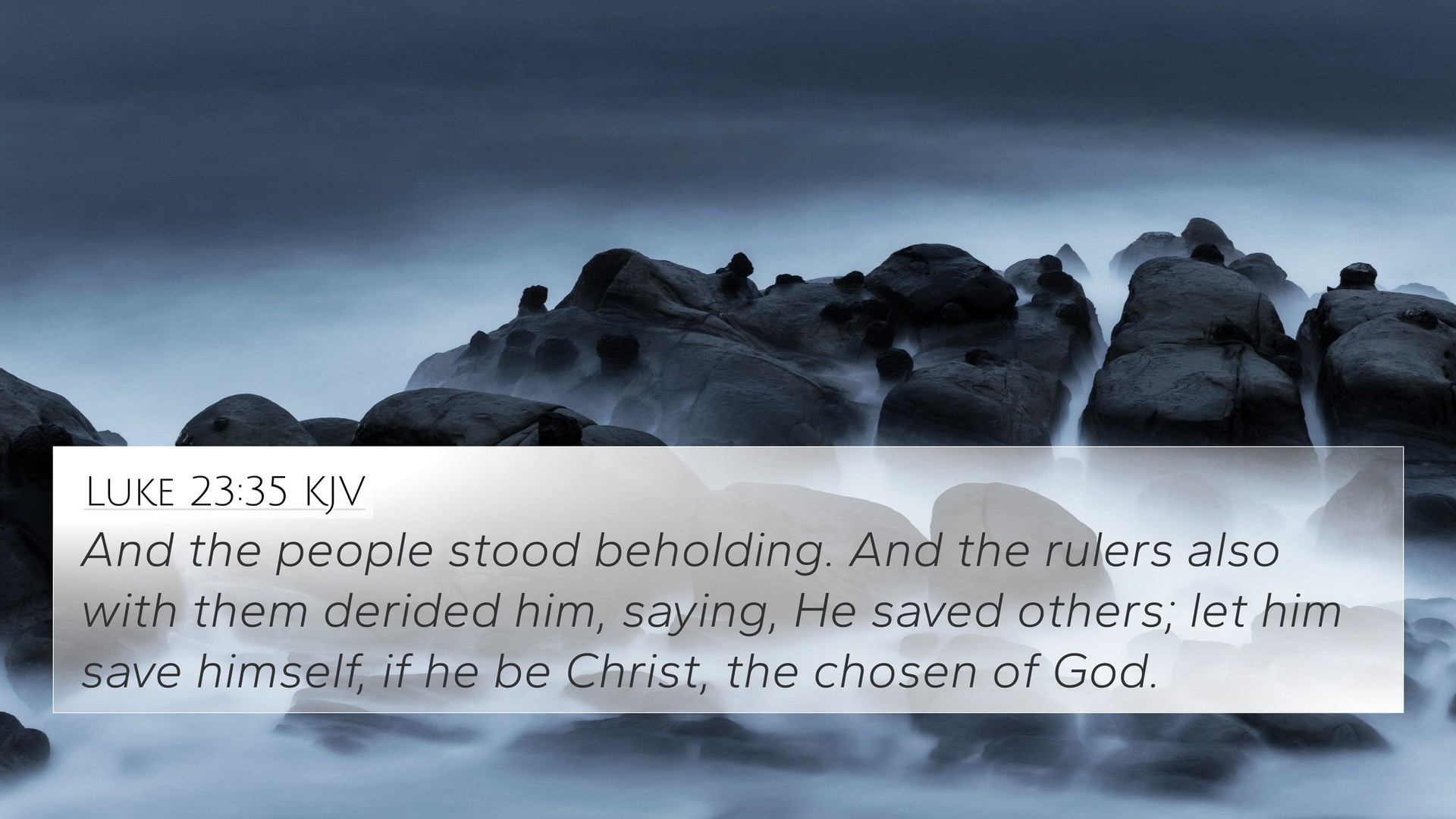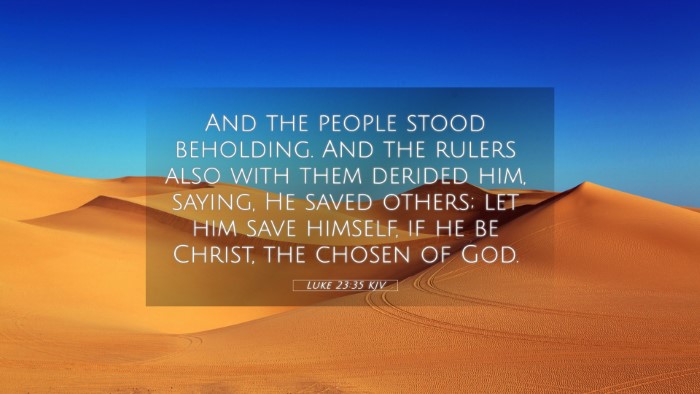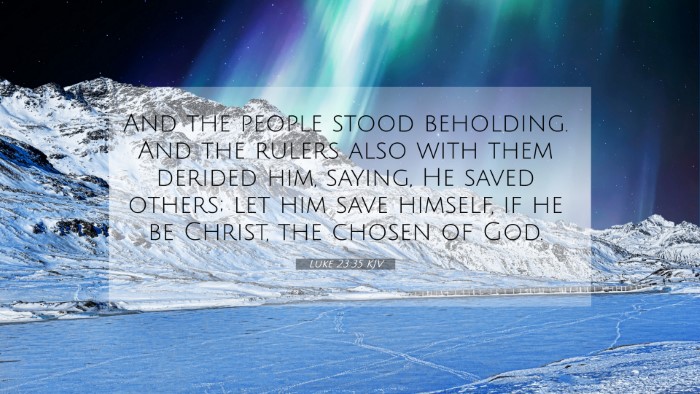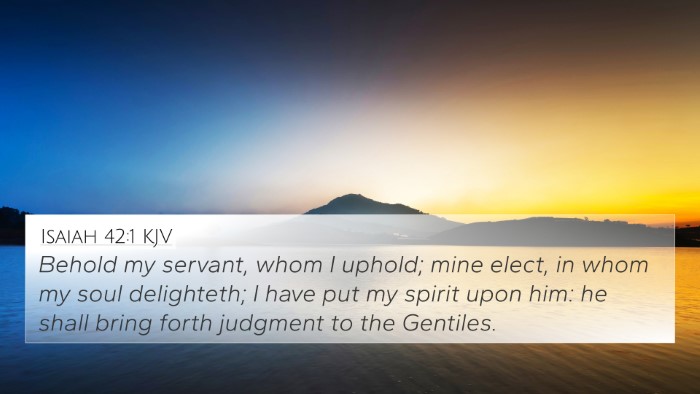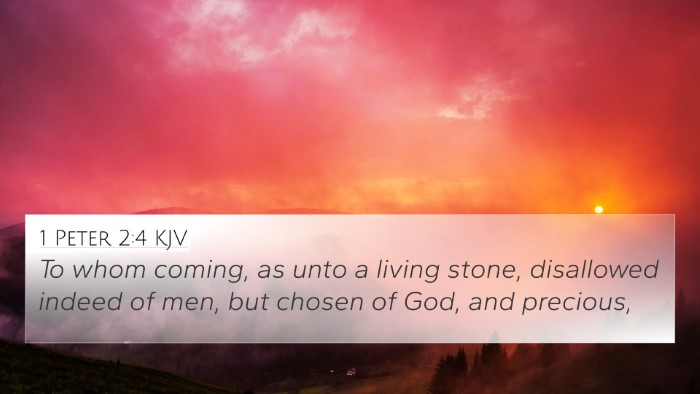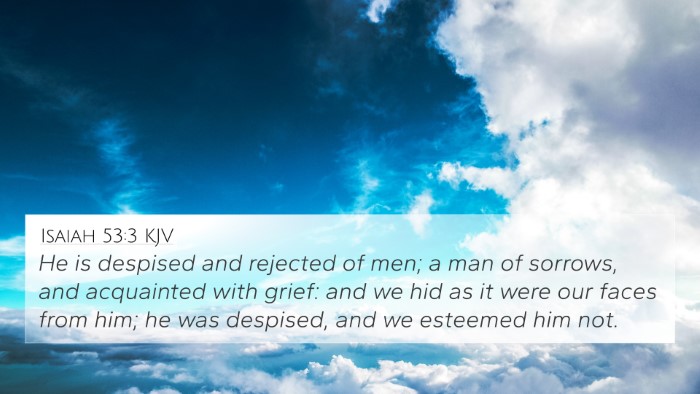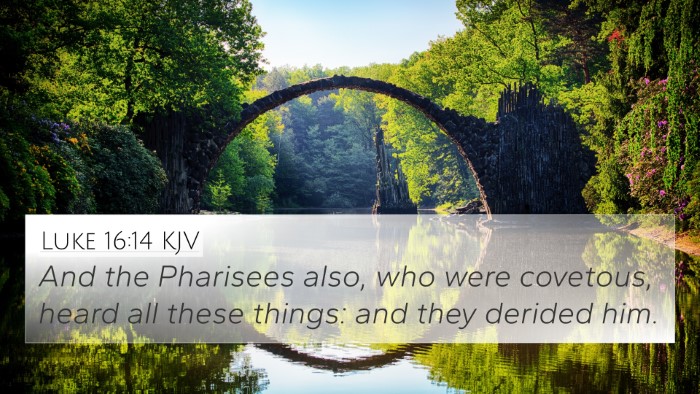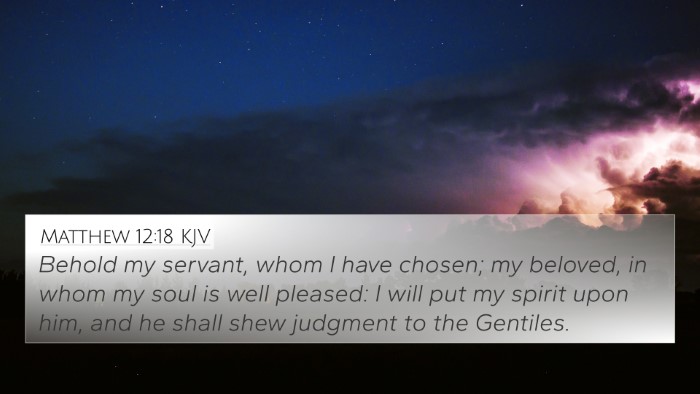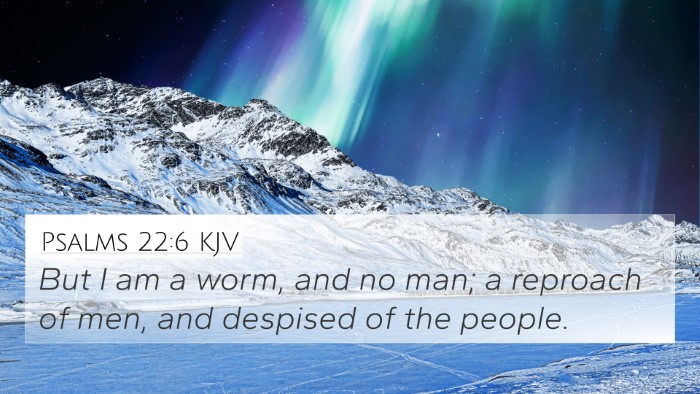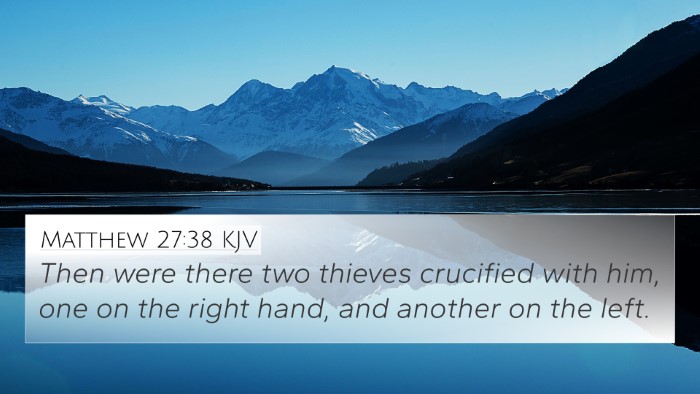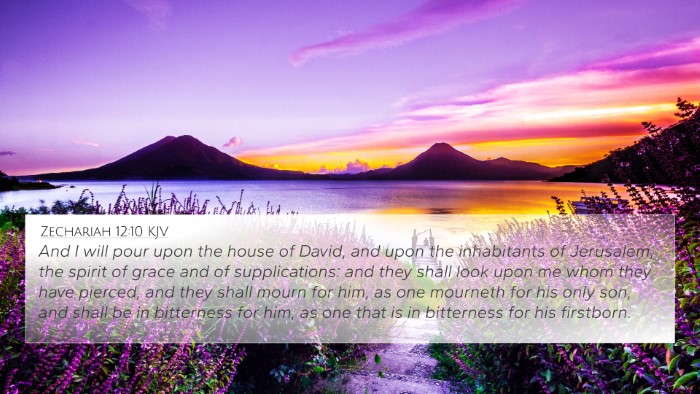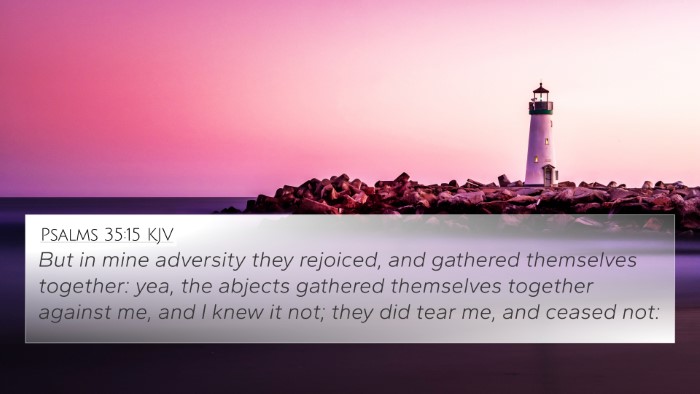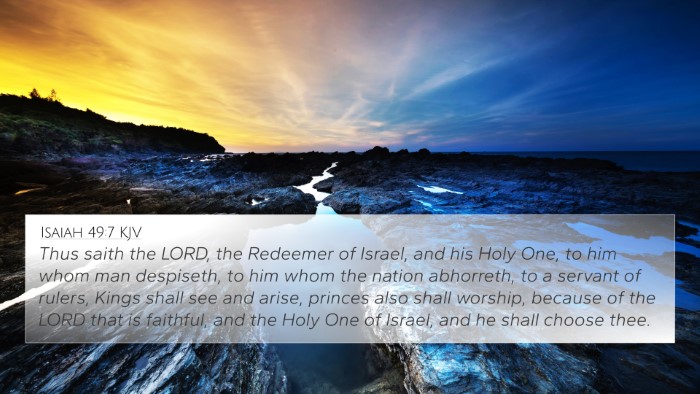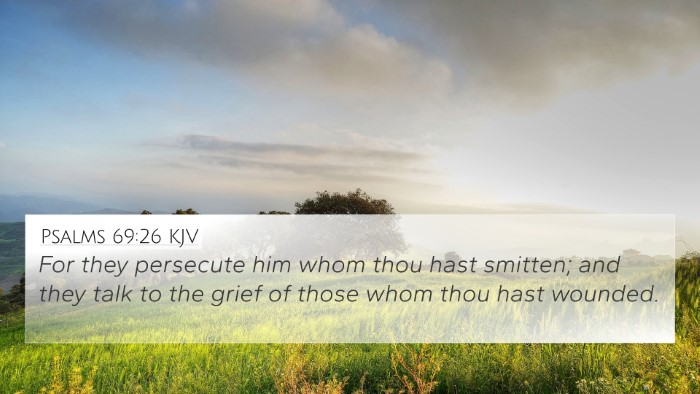Understanding Luke 23:35: Insights and Cross-References
Luke 23:35: "And the people stood beholding. And the rulers also with them derided him, saying, He saved others; let him save himself, if he be Christ, the chosen of God."
Summary and Meaning
The verse Luke 23:35 presents a scene of mockery directed toward Jesus during His crucifixion. The crowd, including the rulers, was questioning His identity as the Messiah by highlighting His inability to save Himself, despite His works of saving others. This moment of derision encapsulates the tragedy and irony of the crucifixion — here, the very Savior is being scorned for the salvation He offers.
Public Domain Commentary Insights
Matthew Henry's Commentary
Matthew Henry notes that this verse marks a fulfillment of the prophecies regarding the Messiah, specifically referencing the scorn and ridicule He would face. The rulers' challenge, "if he be Christ," reflects the disbelief that often surrounded Jesus's ministry. Henry emphasizes the irony that while they demanded proof of His kingship, they were blind to the reality of His mission to save sinners.
Albert Barnes' Notes
Barnes comments that the mockery from the rulers and the people is significant in understanding the rejection Jesus faced. He highlights how this ridicule reveals the heart of humanity, skeptical and resistant to the concept of sacrificial salvation. Barnes links this moment to the broader themes of suffering for righteousness and the fulfillment of God's redemptive plan through suffering. He draws attention to the sarcastic suggestion that if Jesus truly is the Christ, He should demonstrate His power through self-rescue.
Adam Clarke’s Commentary
Clarke emphasizes the social dynamics at play, noting how the crowd has turned from adoration to scorn. He highlights the ironic twist of the statement concerning saving others. Clarke also connects this remark to various Old Testament prophecies, making clear that Jesus's suffering was part of the divine plan. He asserts that this moment illustrates the depth of human sinfulness in rejecting God’s provision for salvation.
Cross-References Related to Luke 23:35
There are several significant verses that connect to the themes presented in Luke 23:35, which can be explored further for a deeper understanding:
- Matthew 27:42: "He saved others; himself he cannot save." This verse reinforces the mockery of the crowd and emphasizes Jesus's sacrificial nature.
- Isaiah 53:3-4: "He is despised and rejected of men; a man of sorrows, and acquainted with grief." This prophetic scripture foreshadows the ridicule Jesus would endure.
- John 12:38: "Lord, who hath believed our report? and to whom hath the arm of the Lord been revealed?" Represents the disbelief and rejection of Jesus as the Messiah by those who should have recognized Him.
- Hebrews 12:2: "Looking unto Jesus the author and finisher of our faith; who for the joy that was set before him endured the cross." Highlights the significance of Jesus's suffering in relation to salvation.
- Psalm 22:7-8: "All they that see me laugh me to scorn: they shoot out the lip, they shake the head, saying, He trusted on the Lord that he would deliver him." A Messianic psalm that parallels the mockery expressed in Luke 23:35.
- 1 Peter 2:23: "Who, when he was reviled, reviled not again; when he suffered, he threatened not; but committed himself to him that judgeth righteously." Shows a Christ-like response to mockery and suffering.
- Luke 4:22: "And all bare him witness, and wondered at the gracious words which proceeded out of his mouth. And they said, Is not this Joseph's son?" Reflects the shifting opinion of Jesus among the people.
- Acts 3:14: "But ye denied the Holy One and the Just, and desired a murderer to be granted unto you." Describes the rejection of Jesus by the very people who once celebrated Him.
- Matthew 26:68: "Saying, Prophesy unto us, thou Christ, Who is he that smote thee?" Further illustrates the mockery directed at Jesus, questioning His prophetic abilities.
- Galatians 6:14: "But God forbid that I should glory, save in the cross of our Lord Jesus Christ." Emphasizes the significance of the cross as a source of both scorn and glory.
Thematic Connections
Thematic Bible verse connections can be drawn from this passage regarding rejection, irony, and the nature of true kingship. Luke 23:35 serves as the climax of the mockery of Jesus, encapsulating both the fulfillment of prophecy and the unveiling of the true nature of Christ’s mission. The efforts to save Himself demonstrate the radical nature of His sacrifice — that He forewent His own escape for the sake of humanity.
Tools for Bible Cross-Referencing
To engage in a deeper study of Luke 23:35 and its related scriptures, utilizing various tools can enhance understanding:
- Bible Concordance: A comprehensive listing of Bible verses for word searches and thematic studies.
- Bible Cross-Reference Guide: Systems that provide connections between verses across both Testaments.
- Cross-Reference Bible Study: Methods that encourage linking related scriptures for a cohesive study experience.
- Bible Reference Resources: Books or online tools that assist with locating and understanding Biblical references.
- Bible Chain References: Systems that connect verses thematically, guiding study across verses that relate to specific topics.
Conclusion
Luke 23:35 stands as a powerful moment in the passion narrative, combining deep irony with an opportunity for reflection on faith and mockery. Studying the connections between this verse and others further enriches one's understanding of the Bible. By employing various methods of cross-referencing, believers can uncover the rich tapestry of scripture that reveals God’s overarching narrative of redemption.
